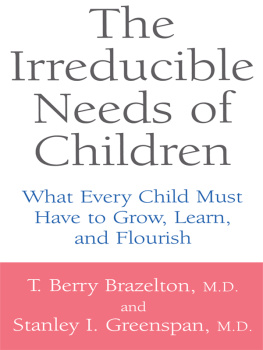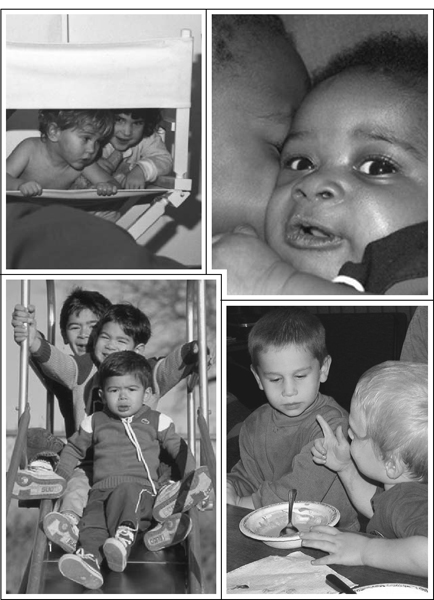also by T. Berry Brazelton, M.D.
On Becoming a Family
The Growth of Attachment Before and After Birth
Infants and Mothers
Differences in Development
Toddlers and Parents
Declaration of Independence
Doctor and Child
To Listen to a Child
Understanding the Normal Problems of Growing Up
Working and Caring
What Every Baby Knows
Families, Crisis, and Caring
Touchpoints
Your Childs Emotional and Behavioral Development
Going to the Doctor
with Bertrand G. Cramer, M.D.
The Earliest Relationship
Parents, Infants, and the Drama of Early Attachment
with Stanley I. Greenspan
The Irreducible Needs of Children
also by T. Berry Brazelton, M.D., and Joshua D. Sparrow, M.D.
Touchpoints Three to Six
Your Childs Emotional and Behavioral Development
Calming Your Fussy Baby: The Brazelton Way
Sleep: The Brazelton Way
Discipline: The Brazelton Way
Toilet Training: The Brazelton Way
Feeding Your Child: The Brazelton Way
Mastering Anger and Aggression: The Brazelton Way
UNDERSTANDING
SIBLING RIVALRY
The
Brazelton Way
T. Berry Brazelton, M.D.
Joshua D. Sparrow, M.D.
PHOTO CREDITS
Photographs on pp. iv (upper left), 14, and 66 copyrightMichel Egron-Polak().
Photographs on pp. iv (lower left) and xx copyrightDorothy Littell Greco.
Photographs on p. iv (upper right and lower right) copyrightMarilyn Nolt().
Many of the designations used by manufacturers and sellers to distinguish their products are claimed as trademarks. Where those designations appear in this book, and where Da Capo Press was aware of a trademark claim, the designations have been printed in initial capital letters.
Copyright 2005 by T. Berry Brazelton, M.D., and Joshua D. Sparrow, M.D.
All rights reserved. No part of this publication may be reproduced, stored in a retrieval system, or transmitted, in any form or by any means, electronic, mechanical, photocopying, recording, or otherwise, without the prior written permission of the publisher. Printed in the United States of America.
Text design by Trish Wilkinson
Set in 11-point Adobe Garamond by the Perseus Books Group
Cataloging-in-Publication data for this book is available from the Library of Congress.
First Da Capo Press edition 2005
ISBN 0-7382-1005-6
ebook ISBN: 9780786739080
Published by Da Capo Press
A Member of the Perseus Books Group
www.dacapopress.com
Da Capo Press books are available at special discounts for bulk purchases in the U.S. by corporations, institutions, and other organizations. For more information, please contact the Special Markets Department at the Perseus Books Group, 11 Cambridge Center, Cambridge, MA 02142, or call (800) 255-1514 or (617) 252-5298, or e-mail special.markets@perseusbooks.com.
1 2 3 4 5 6 7 8 909 08 07 06 05
This book is meant to complement, not substitute for, the advice given by your childs pediatrician. It should not be used as an alternative to appropriate medical care. The authors have exerted every effort to ensure that the information presented is accurate up to the time of publication. However, in light of ongoing research and the constant flow of information, it is possible that new findings may invalidate some of the data presented here. Before starting any treatment or new program, you should consult your pediatrician about your own childs health, symptoms, diagnosis, and treatment.
To the children and parents who have taught us so much through the years
Acknowledgments
We would like to thank parents across the country for having first urged us to write these concise, accessible books on topics of the utmost importance to them, for without their vision they might never have been written. Thanks too go to Karin Ajmani, Marie Caldwell, Geoffrey Canada, Marilyn Joseph and the Baby College staff, Karen Lawson and her late husband Bart, David Saltzman and Caressa Singleton for their unwavering support for our work, and from whom we have learned so much. As always, we would again like to thank our editor, Merloyd Lawrence, for her wisdom and guidance. Finally, we wish to express our gratitude to our families, not only for their encouragement and patience but also for the lessons they have taught us that we have sought to impart in this book.
Preface
Ever since I wrote the first Touchpoints book, published in 1992, I have been asked by parents and professionals all over the country to write some short, practical books on the common challenges that parents face as they raise their children. Among the most common are crying, discipline, sleep, toilet training, feeding, sibling rivalry, and aggression.
In my years of pediatric practice, families have taught me that problems in these areas often arise predictably as a child develops. In these short books I have tried to address the problems that parents are bound to encounter as their children regress just before they make their next developmental leap. Each book describes these touchpointsof crying, discipline, sleep, toilet training, feeding, sibling rivalry, and aggressionso that parents can better understand their childs behavior. Each also offers specific suggestions as to how parents can help their child master the challenges they face in these areas so that they can get back on track.
In general, these books focus on the challenges of the first six years of life, though occasionally older childrens issues are referred to. In the final section, special problems are discussed, though these short books are not intended to cover these topics exhaustively. Instead, we hope that these books will serve as easy-to-use guides for parents to turn to as they face their childs growing pains, or touchpoints that signal exciting leaps of development.
As with Touchpoints Three to Six, I have invited Joshua Sparrow, M.D., to co-author these books with me, to add his perspective as a child psychiatrist. Though difficulties such as siblings who fight, compete, or wont share, for example, are both common and predictable, they make great demands on parents. These kinds of problems are for the most part temporary and not serious, yet without support and understanding, they can overwhelm a family, and send a childs development seriously off course. It is our hope that the straightforward information provided in these books will help prevent those unnecessary derailments, and provide reassurance for parents in times of uncertainty, so that the excitement and joy of helping a young child grow can be rekindled.
UNDERSTANDING
SIBLING RIVALRY
The
Brazelton Way
CHAPTER
Sibling Relationships
Guess what! Im pregnant with my second child, mothers tell me, and then proceed to break into tears. Are you worried that youll desert the older child? I ask. Fighting back more tears, they swear theyll never do that. But they know they will, as soon as the new baby arrives, and I know they will, too.









